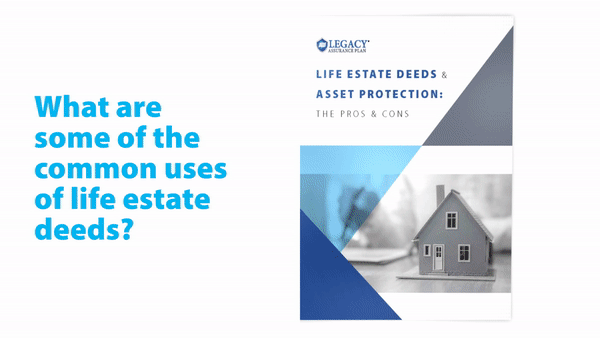Does it make sense to set up a life estate? It all depends on the situation of the life tenant and their beneficiary.
A life estate is a form of joint ownership that gives a person (the life tenant) ownership rights in property during their lifetime. But when the life tenant dies, the remainder interest in the property goes to the beneficiary, also known as the remainderman. Often a parent might create a life estate in order to give their house to their child but retain control over it during the parent's lifetime. There are advantages and disadvantages to creating a life estate, and you should discuss your own situation with your estate planning attorney.
Who can create a life estate?
The grantor of a life estate is often the same person as the life tenant but need not be. A grantor may create a life estate with a deed, the most common practice, but they may also create a life estate in a will or trust.
What kind of property may be transferred with a life estate?
A life estate is typically formed for real estate. For example, a parent might form a life estate for their residential property and make their child the beneficiary. However, life estates are also formed for income-producing investments such as CDs, bonds or real estate investment trusts (REITs). For purposes of this article, we will discuss life estates formed for real estate, the most common use.
What are the rights and obligations of the life tenant and remainderman?
Both the life tenant and the remainderman have ownership rights in the designated property. Neither may sell it without the other's permission during the lifetime of the life tenant.
During the life tenant's lifetime, they have the right to use the property. For example, they could live in it or take any rental income. However, they also must pay expenses including real estate taxes, maintenance, insurance and the capital gains tax exclusion for a personal residence.
What are the pros and cons of life estates?

Whether or not an aspect of a life estate is a pro or a con can often depend on your circumstances and whether or not you are the life tenant or the remainderman. You will want to be aware of the factors we outline below.
- Avoid probate
- Possible tax breaks for the life tenant
- Reduced capital gains taxes for remainderman after death of life tenant
- Capital gains taxes for remainderman if property sold while life tenant still alive
- Remainderman's financial problems can affect the life tenant
- Adverse effect on financing
- The life tenant could get stuck with the remainderman's heirs
- Possible federal gift tax consequences
A life estate does not go through probate, because the life tenant's rights to the property end with their death. The property just passes directly to the beneficiary. That means the beneficiary takes control immediately. Also, the property is not subject to estate taxes, because it is not part of the deceased's estate. It may be subject to gift tax, though, at the time of the life estate's creation.
Creating a life estate may enable the life tenant to enjoy certain tax breaks such as reduced homestead or senior tax exemptions.
A big advantage of the life estate is that if Mom transferred a remainder interest to you, the remainderman, the house would be valued at the date of her death for tax purposes rather than the date Mom bought the house. This usually means much less in capital gains taxes when you sell.
On the other hand, should the property be sold while the life tenant is still alive (which requires agreement of both parties), the remainderman may be looking at some capital gains taxes.

Should the remainderman suffer financial problems such as a lawsuit or collection actions for back taxes, it's possible that a lien could be filed against the life estate property in question. No one can force a life tenant to give up their rights, but creditors or the IRS may be able to collect on the lien if the property is sold.
If property is subject to a life estate, this can adversely affect financing on the property.
It's possible that the remainderman could unexpectedly die before the life tenant. Should that happen, the remainder interest would pass to the remainderman's heirs. If you are the life tenant, this could pair you in joint ownership for the rest ofyour life with someone you had not expected. It's therefore wise to inquire about the remainderman's heirs.
The remainderman may need to claim the life estate property as a gift subject to federal gift tax if the value of the remainder interest is greater than the annual federal gift exemption. In some cases. this may be counterbalanced by the fact that life estate property is not subject to estate taxes.
Once it's done, it's done
After you have created a life estate and appointed a remainderman, you can't change your mind without the agreement of the remainderman. This gives stability to the structure, but you better be sure you are doing the right thing by creating the life estate.
It's not called a form of joint ownership for nothing
-
As we have seen, once a life estate is formed, the life tenant and the beneficiary share a form of joint ownership. This has ramifications:
- If the beneficiary agrees, they would be entitled to part of the proceeds.
- The amount the beneficiary would get depends on a predetermined scale that slides with the life tenant's age and the current interest rates. So, in another words, if the life tenant is relatively young and could expect many more years of enjoyment of the property, they would be entitled to more than if they were older, and the life estate property was likely to be transferred in the near future on the life tenant's death.
- This joint ownership structure serves to ensure the rights of all parties, but the grantor should realize that the life tenant does not have the same rights as a sole owner.
- Likewise, the beneficiary could not sell or mortgage the property without the agreement of the life tenant while the life tenant is still alive.
Medicaid consequences
- Pro: In order to use Medicaid, you must show limited property under their rules. Owning a home or getting proceeds from its sale may disqualify you. If you set up a life estate, however, the property will not count against your Medicaid eligibility. There is a big exception to this however…
- Con: If you set up the life estate within five years before you applied for Medicaid, the transfer may be disallowed, and you could lose Medicaid eligibility. So, if you are thinking of setting up a life estate, do it soon.
Conclusion
We have seen there are both pros and cons to a life estate, and whether or not a life estate is advantageous depends on your own circumstances. Here is a chart that generally describes where the pros and cons fall, but this can vary.
| Pros & Cons of a Life Estate | Pro | Con |
|---|---|---|
| Avoid Probate | ||
| Possible life tenant tax breaks | ✚ | |
| Remainderman capital gains tax advantages | ✚ | |
| Potential effect of remainderman financial problems | ✘ | |
| Effect on financing | ✘ | |
| Remainderman's heirs if remainderman dies first | ✘ | |
| Possible gift taxes | ✘ | |
| Irrevocability absent agreement to end the life estate | ✚ | ✘ |
| Restricted control | ✚ | ✘ |
| Medicaid impact | ✚ | ✘ |



